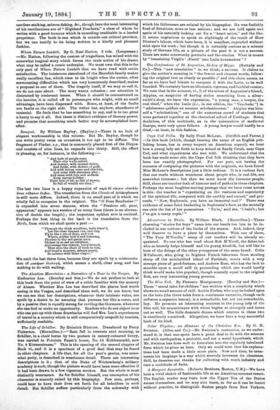The Confessions of St. Augustine, Bishop of Rippe. (Suttaby and
Co.)—This "new translation" is, we think, a success. It claims to give the author's meaning in "the fewest and clearest words, follow- ing the original text as closely as possible ;" and this claim seems, as far as we have had leisure to compare it with the Latin, to be well founded. We certainly have an idiomatic, vigorous, and faithful versior. We note that in the account, vi., 9, of the arrest of Augustine's friend, Alypius, on suspicion of having stolen something from a silver- smith's shop, we have the expression, "a young man, a lawyer, the real thief," when the Latin (i.e., in our edition, the " Tauchnitz ") " adolescens quidam ex numero scholasticornm." Alypius was him- self a " scholasticua," one of the numerous crowd of students that were gathered together at the rhetorical school of Carthage. Some, doubtless, of this multitude, as in the universities of modireval Europe, were very queer follows. A young lawyer would hardly be a thief,—at least, in this fashion.


































 Previous page
Previous page